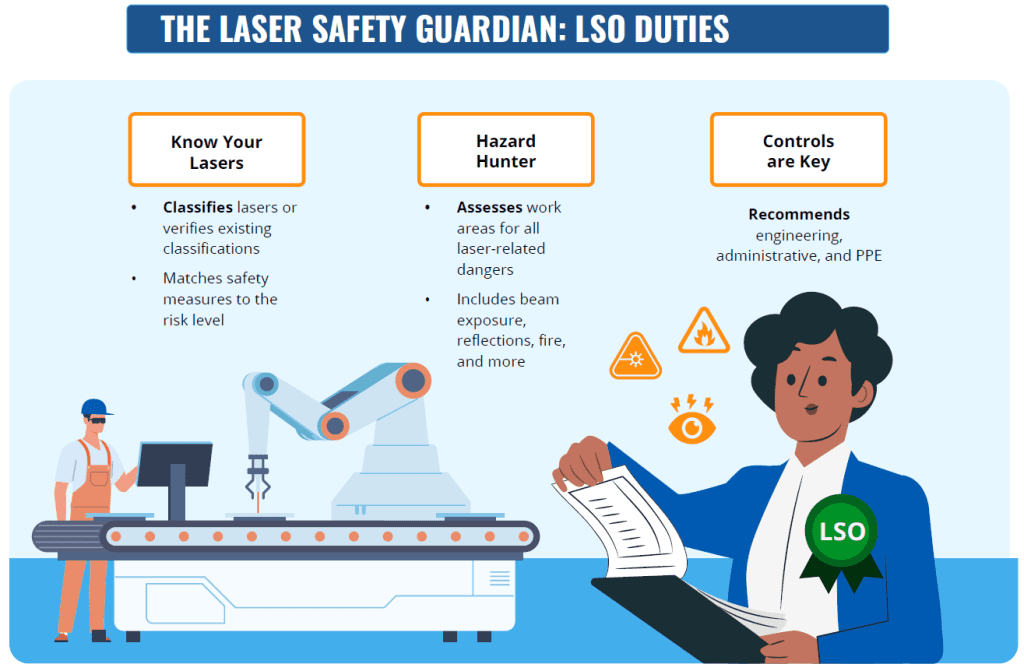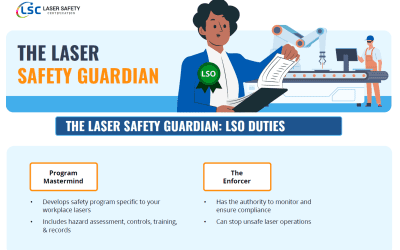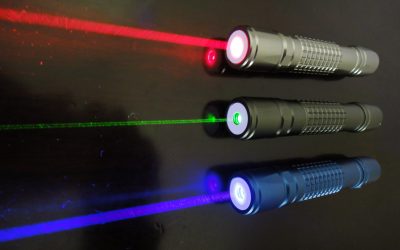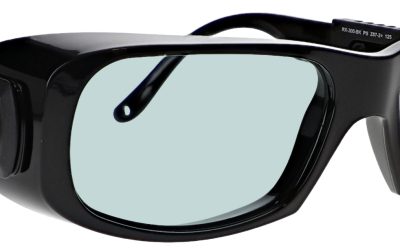How to Become a Certified Laser Safety Officer
Becoming a certified Laser Safety Officer (LSO) is not just a career choice; it’s a crucial step for professionals who want to ensure lasers’ safe and responsible use in various industries, such as healthcare, manufacturing, and research. As the demand for laser technology continues to grow, the role of LSOs in promoting and maintaining a safe working environment has become increasingly important. This comprehensive guide will walk you through becoming a certified LSO, outlining the necessary education, training, and certification requirements.
Understanding the Role of a Laser Safety Officer
What is a Laser Safety Officer?
An LSO is a designated individual responsible for overseeing an organization’s safe use of lasers. Their primary duties include:
- Developing and implementing laser safety policies and procedures
- Conducting risk assessments and hazard evaluations
- Providing training and education to personnel working with lasers
- Ensuring compliance with relevant safety regulations and standards
LSOs protect employees, patients, and the general public from potential laser hazards like eye injuries, skin burns, and fire risks. But their role goes beyond safety. Their expertise is in high demand across various industries, including healthcare, where medical lasers are used for diagnostic and therapeutic purposes, and industrial settings, where lasers are employed for cutting, welding, and engraving applications. This means that as a certified LSO, you’re not just ensuring safety, you’re also opening doors to a wide range of career opportunities.
To effectively carry out their responsibilities, LSOs must possess technical knowledge, safety expertise, and leadership skills. Obtaining laser safety officer certification demonstrates an individual’s commitment to excellence in laser safety. It enhances their credibility within their organization and the broader professional community.
Essential Skills and Qualifications
To excel in their role, LSOs must possess diverse skills and qualifications. These include:
Technical Skills:
- In-depth understanding of laser physics, principles, and applications
- Knowledge of laser safety standards, such as ANSI Z136 and IEC 60825
- Familiarity with laser hazard classification and control measures
Safety and Regulatory Knowledge:
- Thorough understanding of laser safety regulations and guidelines
- Ability to conduct risk assessments and implement appropriate safety controls
- Experience with personal protective equipment (PPE) and engineering controls
Communication and Leadership Abilities:
- Strong interpersonal and communication skills to effectively train and educate personnel
- Ability to collaborate with various departments and stakeholders
- Leadership qualities to enforce safety policies and procedures consistently
Successful LSOs combine technical expertise with a commitment to continuous learning and professional development. They stay current with the latest advancements in laser technology and safety practices to ensure their organization remains compliant and at the forefront of laser safety management.
Steps to Becoming a Certified Laser Safety Officer
Education and Training Requirements
Candidates must meet specific educational and training requirements to become a certified Laser Safety Officer (LSO). While there is no universally mandated minimum education level, most LSOs hold at least a bachelor’s degree in a relevant field, such as physics, engineering, or occupational safety.
In addition to formal education, aspiring LSOs should complete a certification course specific to their laser application. We offer 3 different types of LSO Certifications:
- Industrial LSO Certification – ideal for manufacturing and laboratory environments
- Healthcare LSO Certification – for hospitals, private practices, veterinary, and dental offices
- Cosmetic LSO Certification – primarily for laser skin care facilities, but also laser hair/tattoo removal
Obtaining Certification
Once you’ve met the necessary educational and training requirements, you’re ready to pursue LSO certification. The certification process typically involves the following steps: application, examination, and renewal. This guide will provide you with all the information you need to successfully navigate these steps and become a certified LSO.
- Application: Apply to the certifying body, providing proof of education, training, and experience.
- Examination: Pass a comprehensive written examination that tests knowledge of laser safety principles, standards, and best practices.
- Renewal: Maintain certification through ongoing education and professional development activities, such as attending conferences, workshops, or webinars.
Aspiring LSOs can also explore online certification options, which offer flexibility and convenience for professionals seeking to advance their careers. To learn more about the role and responsibilities of an LSO, visit our blog post, “What Is A Laser Safety Officer.”
How to Become a Certified Laser Safety Officer Online
In today’s digital age, aspiring Laser Safety Officers (LSOs) can obtain certification through online programs. This convenient and flexible approach to learning has gained popularity among professionals seeking to advance their careers while balancing work and personal commitments.
Benefits of Online Certification
Online LSO certification offers several advantages over traditional in-person training:
Flexibility and Convenience:
- Learn at your own pace and schedule
- Access course materials anytime, anywhere with an internet connection
- Eliminate the need for travel or time away from work
Cost-effectiveness:
- Save on expenses associated with in-person training, such as travel and accommodation
- Often more affordable than traditional classroom-based courses
- Potential for employer reimbursement or sponsorship
Online certification programs provide a comprehensive and engaging learning experience featuring interactive modules, multimedia content, and virtual simulations. Candidates can acquire the necessary knowledge and skills to become certified LSOs without compromising on the quality of education.
Career Opportunities for Laser Safety Officers
As the use of lasers continues to expand across various industries, the demand for qualified Laser Safety Officers (LSOs) is on the rise. LSOs play a crucial role in ensuring the safe and compliant operation of laser devices, making them valuable assets to organizations in diverse sectors.
Industries Hiring Laser Safety Officers
Healthcare/Cosmetic LSO:
- Hospitals and clinics employing medical lasers for surgical, diagnostic, and therapeutic procedures
- Dental practices utilizing lasers for oral surgery and cosmetic dentistry
- Aesthetic medicine centers offering laser treatments for skin rejuvenation and hair removal
Industrial LSO:
- Manufacturing companies using lasers for cutting, welding, marking, and engraving
- The automotive industry employs lasers for precision manufacturing and quality control
- The aerospace sector utilizes lasers for the manufacturing and maintenance of aircraft components
Research and Development LSO:
- Academic institutions conducting laser-based research in physics, chemistry, and engineering
- National laboratories and scientific facilities operating high-power lasers for advanced experiments
- Private R&D firms developing new laser technologies and applications
The versatility of lasers across these industries creates many career opportunities for LSOs, ranging from entry-level positions to senior leadership roles.
Job Roles and Responsibilities
The daily tasks and responsibilities of an LSO may vary depending on the industry and specific organization, but typically include:
- Developing and implementing laser safety policies and procedures
- Conducting risk assessments and hazard evaluations for laser operations
- Providing laser safety training and education to personnel
- Ensuring compliance with relevant safety regulations and standards
- Investigating laser-related accidents and incidents and implementing corrective actions
- Maintaining accurate records and documentation of laser safety activities
- Collaborating with other departments and stakeholders to promote a culture of laser safety
As LSOs gain experience and demonstrate their expertise, they may have opportunities for career advancement, such as:
- Progressing to senior LSO positions with increased responsibilities and oversight
- Transitioning into managerial roles, such as Director of Laser Safety or Environmental Health and Safety Manager
- Becoming consultants or trainers, providing laser safety services to multiple organizations
- Participating in the development of new laser safety standards and regulations
The career path for LSOs is diverse and rewarding, offering the chance to make a tangible impact on the safety and well-being of others while contributing to advancing laser technology across various industries.
FAQs about Laser Safety Officer Certification
What do you need for CLSO certification?
To obtain the Certified Laser Safety Officer (CLSO) certification, candidates must meet the following core requirements:
- Education: A minimum bachelor’s degree in a related field, such as physics, engineering, or occupational safety, is typically required. Some certifying bodies may accept equivalent work experience instead of a degree.
- Experience: Candidates must have a certain number of years of professional experience working with lasers or in laser safety. The exact requirement varies by certifying organization but generally ranges from 1-3 years.
Additionally, candidates must complete an approved LSO training course and pass a comprehensive examination to demonstrate their knowledge and understanding of laser safety principles, standards, and best practices.
Where may the CLSO designation be used?
The CLSO designation is widely recognized and valued across various industries and environments where lasers are used, including:
- Healthcare facilities, such as hospitals, clinics, and dental practices
- Industrial settings, such as manufacturing plants, automotive factories, and aerospace companies
- Research institutions, including universities, national laboratories, and private R&D firms
- Government agencies and military installations
- Entertainment and display industries, such as laser light shows and theatrical productions
CLSO certification demonstrates an individual’s expertise and commitment to laser safety, making them a valuable asset to any organization that employs laser technology.
How many laser courses do you need?
The number of laser safety courses required for LSO certification varies depending on the certifying body and the candidate’s prior experience. However, most organizations recommend the following training:
- Essential Laser Safety Officer (LSO) Course: This foundational course covers the basic principles and practices of laser safety, including laser fundamentals, hazard analysis, and control measures. It is typically a prerequisite for more advanced training.
- Advanced Laser Safety Officer (ALSO) Course: This course builds upon the knowledge gained in the introductory LSO course, delving into more complex topics such as non-beam hazards, laser facility design, and regulatory compliance.
- Specialty Laser Safety Courses: Depending on the specific industry or application, additional courses may be necessary, such as Medical Laser Safety Officer (MLSO) training for healthcare professionals or Laser Safety in Research and Development for those working in R&D settings.
To maintain CLSO certification, individuals must engage in ongoing education and professional development activities, such as attending conferences, workshops, or webinars related to laser safety. Most certifying bodies require CLSOs to complete a certain number of continuing education units (CEUs) within a specified timeframe to ensure they stay current with the latest advancements and best practices in the field.
Integrating Laser Safety into Your Career
As a Certified Laser Safety Officer (CLSO), it is essential to continuously enhance your knowledge and skills to keep pace with the ever-evolving laser technology landscape. Integrating laser safety into your career involves a commitment to ongoing learning, professional development, and active engagement within the laser safety community.
Importance of Continuing Education
Continuing education is crucial in maintaining and expanding your expertise as a CLSO. By staying current with the latest industry standards, best practices, and technological advancements, you can ensure that your organization remains compliant and at the forefront of laser safety.
Some ways to pursue continuing education include:
- Attending workshops, webinars, and training sessions offered by professional organizations or certifying bodies
- Completing advanced certifications or specializations, such as the Certified Medical Laser Safety Officer (CMLSO) or the Laser Safety Officer for Research and Development (LSO-R&D)
- Participating in online courses or self-study programs related to laser safety
- Engaging in peer-to-peer learning and knowledge sharing with other CLSOs
Regularly updating your knowledge and skills enhances your value as a CLSO and demonstrates your dedication to professional growth and the advancement of laser safety practices.
Networking and Professional Development
Networking and professional development opportunities are essential for CLSOs looking to expand their career prospects and make meaningful contributions to the laser safety community. Engaging with fellow professionals allows you to exchange ideas, share best practices, and stay informed about the latest trends and challenges in the field.
Some practical ways to network and develop professionally include:
- Joining professional organizations, such as the Laser Institute of America (LIA) or the International Laser Safety Conference (ILSC)
- Attending industry conferences, symposiums, and trade shows focused on laser safety and related topics.
- Participating in online forums, discussion groups, or social media platforms dedicated to laser safety professionals
- Collaborating with other CLSOs on research projects, case studies, or the development of new laser safety guidelines
By actively participating in the laser safety community, you can establish yourself as a thought leader, contribute to the profession’s advancement, and open up new career opportunities.
Integrating laser safety into your career is an ongoing process that requires dedication, curiosity, and a willingness to adapt to change. By prioritizing continuing education, networking, and professional development, you can build a fulfilling and impactful career as a Certified Laser Safety Officer, making a lasting difference in the safety and well-being of those working with laser technology.
Unlock Your Potential as a Laser Safety Professional with Laser Safety Certification
Start Your Journey to Become a Certified Laser Safety Officer with Laser Safety Certification
Are you ready to take your career in laser safety to the next level? Look no further than Laser Safety Certification, your trusted partner in providing comprehensive and industry-recognized training programs. By choosing Laser Safety Certification, you’ll gain access to:
- Expert instructors with real-world experience in laser safety
- Cutting-edge course materials and interactive learning tools
- Flexible online and in-person training options to suit your schedule
- Personalized support and guidance throughout your certification journey
Our courses are designed to equip you with the knowledge, skills, and confidence needed to excel as a Certified Laser Safety Officer (CLSO). Laser Safety Certification is the right program whether you’re new to the field or looking to advance your career.
Take advantage of this opportunity to invest in your professional growth and make a meaningful impact on the safety of laser operations. Enroll in one of our laser safety officer certification courses today and take the first step toward unlocking your full potential as a laser safety professional.
Are you still trying to understand the role and responsibilities of a Laser Safety Officer? Our blog post, “What Is A Laser Safety Officer?” provides valuable insights and information to help you better understand this critical position.
At Laser Safety Certification, we’re committed to your success and advancing laser safety practices worldwide. Join our growing community of CLSOs and be at the forefront of this dynamic and rewarding field.
Act now and embark on your journey to become a Certified Laser Safety Officer with Laser Safety Certification. Your future in laser safety starts here.




